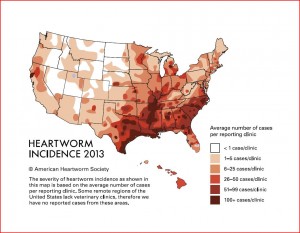What is heartworm disease, and why should I think about it in my pet? How are heartworms transmitted? It’s cold in Central New York in the winter—do I need to think about heartworms all year round? These are questions we answer every day, which means this really is an issue for us. I went to veterinary school in the south (Go Vols!), and at that point heartworm was thought of as a primarily Southern disease and our preventives were tablets given daily. Veterinary medicine, like the world in general, has changed during that period, necessitating that we adapt as well.
We’ve got a few theories as to why we’re seeing an increased incidence of heartworm disease in Central NY. Our climate has changed, our pets are travelling further, insect vectors seem to have developed the ability to defy death. There were approximately 250,000 pets that were displaced by Hurricane Katrina; many of these pets (and thousands of others since) were relocated from the South to the North. Many of these pets brought with them unwanted stowaways–heartworm larvae within their bloodstreams. Our wild animal population has happily volunteered (no, not those Vols) to maintain a reservoir–stray or neglected dogs, coyotes, and foxes all can carry heartworm. The incidence of heartworm in our area pre-Katrina was one to five positive cases per clinic per year. Last year’s incidence map is below–CNY has made a huge advance in heartworm disease, but not in the direction we’d have liked to:
Dr. Laxen has put together some facts on heartworm disease, which we’ve posted below. But first, the answer to the mosquito question we posted on Facebook:
Mosquitoes are cold-blooded creatures and do not generally bite in temperatures below 50F. In New York, some adult mosquitoes become inactive with the onset of cold weather and enter into hibernation before the first frost. Other mosquitoes die in the fall but have winter-hardy eggs, which hibernate as embryos. Those warm spells we all covet during the winter months can allow the hibernators to become active and the larvae to hatch. Figure a minimum of 90 days in a row below freezing and without a thaw before we can say we’re (temporarily) mosquito free. One warm day, and the clock starts over.
Dr. Otto
Heartworm Facts
Heartworm disease is caused by parasitic worms that live in the blood vessels of the lungs and can then migrate into the right side of the heart in many species of mammals, including dogs and cats. This potentially fatal disease is carried by mosquitoes that become infected by biting an already infected dog. Adult heartworms can survive and reproduce in the dog’s lungs and heart for approximately 5-7 years. Heartworm is found in all 50 states; while it has been widespread in southern states for many years, an increasing number of cases are now seen in northern states including New York.
Early in the disease, infected dogs may show no signs at all. As it progresses, they may begin to cough and show exercise intolerance, until they display marked lethargy, decreased appetite, weight loss, and even death in late stages of the disease. Most cases of heartworm that are detected in dogs early in the course of the disease can be successfully treated; as the disease progresses and the signs become more severe, the prognosis becomes more guarded even with treatment.
Treatment of heartworm disease involves injection of a drug designed to kill the adult worms living in the lungs and heart. Unfortunately, treatment can be quite expensive and dogs can be at risk of serious complications of treatment, especially when they are in the later stages of heartworm disease to begin with. Also, it takes months for the infected dog to recover and to completely eliminate the parasitic worms.
Heartworm infection is easily detected in dogs by a quick blood test that can be run right in the clinic at your dog’s next visit. It takes about 6 months after a dog is bitten by an infected mosquito before the blood test will show up as positive, making it very important to test dogs every year even when a mosquito bite was not observed.
Heartworm disease is easily preventable. There are a number of excellent products that when given monthly year-round prevent and control common intestinal parasites as well as heartworm disease. If your dog is not currently on heartworm prevention, please contact our office immediately. We will be happy to help you and protect your four-legged companion from this horrible disease and answer any further questions you may have.
Dr. Laxen
Source: American Heartworm Society – www.heartwormsociety.org

